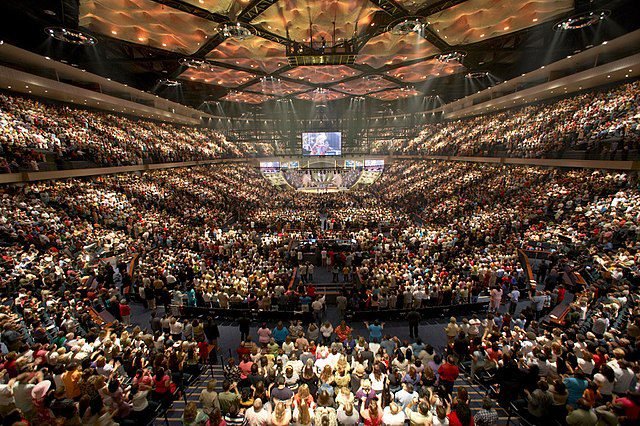
Evangelical churches, pastors, colleges, and parachurch organizations are using sleight of hand to distance themselves from the toxicity associated with labels such as Evangelical and Evangelicalism. Instead of using the E word, Evangelicals say they are “nondenominational.” This implies they are detached from Christianity proper, when, in fact, they are explicitly Evangelical.
Lifewise Academy advertises itself as nondenominational, hoping unaware people won’t pay attention to its Evangelical theology and practice. One of my goals as a writer is to pull back the nondenominational facade so people can see that a church, pastor, or parachurch organization is actually an Evangelical in nondenominational clothing.
Southern Baptists have been playing this game for years. Realizing that Southern Baptist (or Baptist, in general) is an increasingly toxic label, churches change their names, dropping the Baptist identifier. These churches are in every way Baptist, yet people unaware of the scam think such churches are nondenominational. Take Saddleback Church, formerly pastored by Rick Warren. Saddleback’s name has a nondenominational vibe, when, in fact, the church is affiliated with the Southern Baptist Convention. Numerous megachurches play this game, hoping people will be attracted to them by their generic, nondenominational name.
Evangelicalism is a sect. I have battled with newspaper editors for many years over my insistence that Evangelical and Evangelicalism be capitalized. These proper nouns are no different from Baptist, Methodist, Presbyterian, or Christian. To be Evangelical means holding certain beliefs. While there is diversity within Evangelicalism, there are core beliefs and practices one must hold to be considered Evangelical. I am aware that there are numerous people who self-identify as Evangelical, who are not actually Evangelicals. This is especially true on the far-left end of the Evangelical spectrum. These people are liberals who, for a variety of reasons, refuse to leave Evangelicalism. Some of them think Evangelicalism can be “saved” or their personal and familial connections are such that they can’t or won’t leave their tribe. I suspect part of the problem is that they look over the fence at mainline churches and find themselves saying, “why bother?” Mainline churches are, for the most part, dying. Aging members and clerics don’t make attractive stops for younger adults or families with children. So, liberal-minded Evangelicals stay where they are, despite their increased dissatisfaction with their churches and pastors.
With rare exceptions, when you see a nondenominational church, know that it is Evangelical in doctrine and practice. Evangelicalism is the largest sect in the United States. Even among denominational churches, many of them are affiliated with Evangelical sects. Add to this mainline churches that are Evangelical or pastored by Evangelical-trained men, I can safely say that the United States is largely an Evangelical nation. Oh, the labels are legion, and many churches/pastors will try to hide their Evangelical bona fides, but when you take a close look at their theology and practice, they are decidedly Evangelical.
The mainstream media needs to stop allowing Evangelicals to hide behind the nondenominational facade. One news report I recently read said that a particular church was nondenominational, but its beliefs were Evangelical. That’s the right approach to take. Many Americans think the term nondenominational denotes a church or pastor that is inclusive or non-threatening. This is patently untrue. Just today I read an article by Evangelical zealot Mike Brown where he was trying to distance the January 6th Insurrection from the fact that many of the insurrectionists were Evangelicals or Evangelical adjacent. Brown even went so far as to use the No True Scotsman Fallacy to suggest that the violent, lawbreaking insurrectionists weren’t “real” Evangelicals. Most of the insurrectionists were Christians; not just any Christians, but Evangelicals. Many of them were members of nondenominational churches. Some of the most dangerous ideology in America is coming out of nondenominational churches. We must not allow the media to misidentify whom these people are and what they believe. We must learn to distinguish between these various labels. Some Christians are my allies. We hold similar political and social beliefs. We may disagree on the God question, but we have common ground on a broad array of issues. Evangelicals are Christians too, but their political and social beliefs are diametrically opposed to mine. The media owes it to the American people to make sure we understand the difference between the two.
Bruce Gerencser, 66, lives in rural Northwest Ohio with his wife of 45 years. He and his wife have six grown children and thirteen grandchildren. Bruce pastored Evangelical churches for twenty-five years in Ohio, Texas, and Michigan. Bruce left the ministry in 2005, and in 2008 he left Christianity. Bruce is now a humanist and an atheist.
Connect with me on social media:
Your comments are welcome and appreciated. All first-time comments are moderated. Please read the commenting rules before commenting.
You can email Bruce via the Contact Form.
